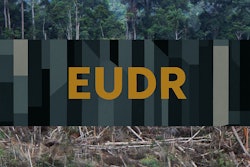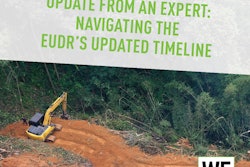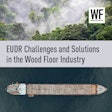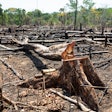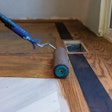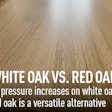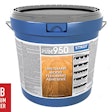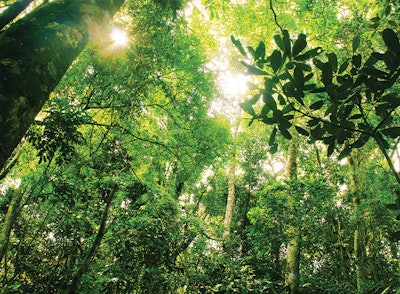
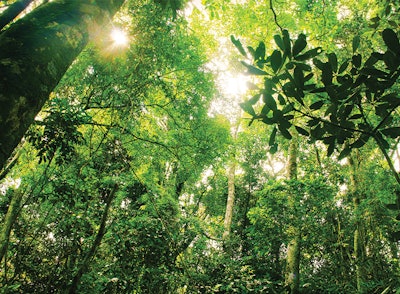 Not all companies logging in Brazil are destroying the rainforest, but it's important to ask the right questions when sourcing products to ensure they were sustainably harvested.
Not all companies logging in Brazil are destroying the rainforest, but it's important to ask the right questions when sourcing products to ensure they were sustainably harvested.
Our world has become increasingly conscious of the environment around us and what we are doing to access products responsibly. From cosmetics to clothing to coffee,
it seems every industry is looking in the mirror to address an ever-engaged population to answer difficult questions. The hardwood flooring category has certainly heard similar questions, from the accessing of raw materials to the products being used in the manufacturing process. In a true global economy, like the one we inhabit today, it has become apparent that these hard questions need to be met with honest answers and engaged conversation.
My mother had a favorite expression of "don't throw the baby out with the bathwater" when she was referring to trying to limit yourself with painting any situation with too broad a brush. I believe that in almost every industry, we can point out companies that go above and beyond to do the right thing, and others that are determined to cut corners in the name of fast turns and higher profits. That is likely never going to change, so it brings us to a great discussion and question on, "How do I really know?"
Today, hardwood flooring comes from just about every corner of the globe and in every possible species and construction. That abundance of supply and creativity is really what our industry, and country, was founded on. In recent years, however, the industry has realized the need to come to grips with some of the questions that have been simmering in the background. From the source of materials being used for wood production in China to illegal harvesting of tropical woods in South America to the sustainability of forests in the United States, our industry is being forced to take a step back and gain a better understanding of exactly what we are selling and producing for today's consumer.
Recently, the spotlight has focused on Brazil, where President Jair Bolsonaro has come under attack from vocal critics for his administration's apparent indifference toward practices that created questions around the Amazon basin for years. Bolsonaro won election on opening the rainforest back up to industry, and it appears the pendulum has begun to swing in a dangerous new direction. Prior to Bolsonaro's election, Brazil had made significant progress in the protection of the Amazon basin and rainforest ecosystem. Critics believe that relaxing the restrictions previously placed is leading toward greater threats to the world's fragile ecosystem.
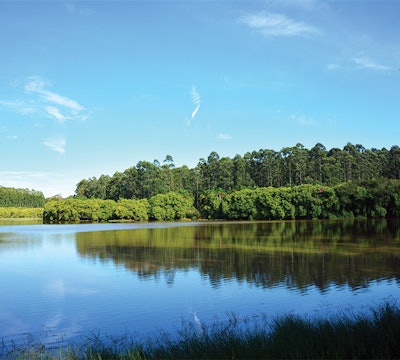 Reforestation farms like the one pictured in Brazil are essential to creating carbon capture from previously degraded land. (Photo courtesy of Indusparquet)
Reforestation farms like the one pictured in Brazil are essential to creating carbon capture from previously degraded land. (Photo courtesy of Indusparquet)
Understandably, consumers today want their products to come from responsible sourcing and legal timber, manufactured by companies with high ethical standards and a commitment to the craftsmanship, their country and the greater good for our planet. That leads many people to now ask: Should we stop buying wood floors from Brazil and the rest of South America?
I can say with confidence that the answer to that question is: Absolutely not. But I do encourage you to ask some pretty important questions of exotic flooring suppliers:
1) Where are they actually producing their wood floors?
Is the Brazilian cherry, or botanical name "jatoba," harvested from managed forests, able to be traced from the forest to the floor and finished and shipped from South America? There are far too many examples of illegal timber sourcing through the practice of clear cutting, shipping the product to other markets like Asia, finishing the products there and then shipping to the United States. There's no chain of custody, no tracing of the timber … no one to really answer the important questions.
2) What is their process for harvesting lumber? Do they follow IBAMA guidelines?
Most businesses are populated by good actors and bad ones. The bad is what I just described, but I would submit there are also manufacturers doing things right. They legally acquire their timber through a series of managed forests around the region, bring that tagged lumber to central locations and go about precisely manufacturing their hardwood flooring. The guidelines of IBAMA (Brazil's government regulator of forest products) demand that only eight trees per ¾ acre can be removed from a forest and that endangered and "seed carrying" trees are left alone. Because few trees are removed and the fertile ones remain, the forest maintains its canopy and can regenerate by itself. From there, every tree harvested is tagged with a unique ID code that is controlled by GPS technology and stays with the tree through the manufacturing process.
3) Does your supplier carry the Forest Stewardship Council (FSC) certification chain of custody?
That is the highest standard for wood flooring manufacturers and assures everyone that products are being produced from timber acquired from managed forests, according to the strictest social and environmental criteria. While you do not need to necessarily purchase FSC certified woods, it would be particularly important to know if your supplier maintains that designation. That will give you comfort in knowing the product is being acquired and produced under the strictest of guidelines.
Far too often in life, we end up making judgements on many from the actions of a small few. The discussion around sustainability and ethical sourcing is here to stay and I believe these are important conversations to have. Life would be boring if everything were the same, and we are so lucky to have a multitude of manufacturers producing every look and species for every different level of consumer. We all have a responsibility to engage and educate one another in this discussion, because the wood flooring industry is better when we embrace our diversity.
RELATED: Validating Green Claims: What’s Behind Certifications?















